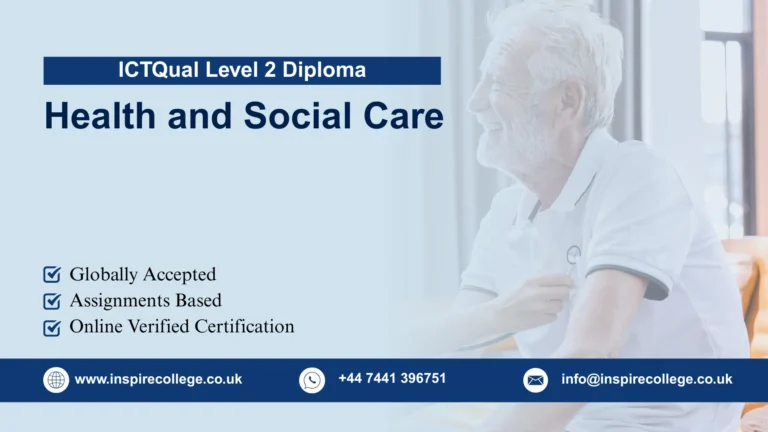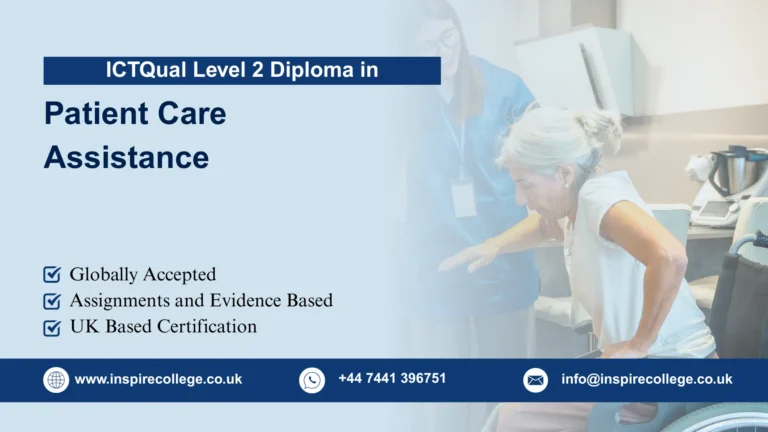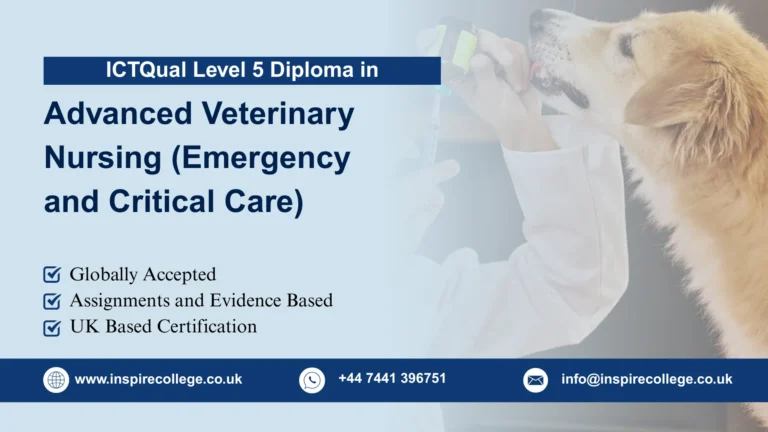
ICTQual AB Level 1 Diploma in Basic Life Support BLS Training
The ICTQual AB Level 1 Diploma in Basic Life Support (BLS) Training provides learners with the essential knowledge and hands-on skills required to respond effectively in life-threatening emergencies. Basic Life Support is a critical skill set for anyone who may encounter medical emergencies at home, in the workplace, or within community settings. This course is designed to build confidence and competence in applying life-saving techniques, ensuring learners are well-prepared to act when every second counts.
The purpose of ICTQual AB Level 1 Diploma in Basic Life Support BLS Training is to introduce participants to the fundamental principles of basic life support, CPR (Cardiopulmonary Resuscitation), and the safe use of an Automated External Defibrillator (AED). Through structured learning and practical demonstrations, learners will develop the ability to assess emergency situations, provide immediate care, and stabilise patients until professional medical help arrives.
Participants will gain valuable skills in CPR for adults, children, and infants, airway management, recovery positioning, and the recognition of common medical emergencies such as choking, cardiac arrest, and respiratory distress. In addition, ICTQual AB Level 1 Diploma in Basic Life Support BLS Training highlights the importance of personal safety, ethical responsibilities, and effective communication during emergencies.
This Level 1 BLS diploma is suitable for individuals with little or no prior experience, making it an excellent starting point for those seeking to improve their emergency response capabilities. It is also ideal for employees, caregivers, volunteers, and community members who want to enhance workplace safety, comply with health regulations, and contribute to saving lives.
By completing ICTQual AB Level 1 Diploma in Basic Life Support BLS Training, learners will gain a recognized foundation in Basic Life Support, opening the pathway to higher-level training in emergency care, pre-hospital response, and healthcare-related professions.
The ICTQual AB Level 1 Diploma in Basic Life Support (BLS) Training is designed to be accessible to a wide range of learners while maintaining essential entry standards that create a safe and effective learning environment. The entry requirements ensure that all participants are prepared to fully engage with the course content and successfully acquire the life-saving skills taught throughout the program.
Minimum Age Requirement
Learners enrolling in this qualification must be at least 16 years of age. This age requirement reflects the level of maturity, responsibility, and physical ability needed to perform life-saving interventions such as CPR and emergency response actions.
Basic Literacy and Numeracy Skills
A fundamental ability to read, write, and understand basic instructions is necessary for successful participation. Learners will be required to follow written and verbal guidance, complete assessments, and interpret emergency protocols, making literacy and numeracy essential for effective learning and application.
Physical Fitness
Because this course involves hands-on training in critical techniques such as chest compressions, airway management, and the recovery position, learners should be in reasonably good physical health. A basic level of physical fitness ensures that participants can actively engage in practical demonstrations and confidently apply skills during real-life emergencies.
No Prior Experience Required
This diploma is an entry-level qualification and has been designed specifically for individuals with little to no prior training in first aid or healthcare. It provides a strong foundation for complete beginners while also serving as a valuable refresher for those who may have received informal or outdated training in the past.
Commitment to Health and Safety
Participants should demonstrate a genuine willingness to learn and apply safety principles throughout the course. Since this qualification equips learners to act in life-threatening situations, a strong sense of responsibility, awareness of safety procedures, and readiness to respond effectively are crucial to success.
By meeting these entry requirements, learners will be well-prepared to gain the knowledge, confidence, and hands-on experience needed to perform Basic Life Support and contribute positively to emergency response in community, workplace, or home settings.
Mandatory Units
The ICTQual AB Level 1 Diploma in Basic Life Support BLS Training qualification consists of 6 units and 18 Credits for the complete qualification.
- Fundamental Concepts of Life Support
- Emergency Scene Management and Patient Assessment
- CPR, AED, and Advanced Airway Management
- Recognizing and Responding to Cardiac Emergencies
- Managing Trauma and Environmental Emergencies
- Health and Safety Regulations in BLS
Fundamental Concepts of Life Support
- Understand the foundational principles of Basic Life Support and its significance in emergency care.
- Identify and explain the key elements of the “Chain of Survival” in life-threatening medical situations.
- Recognise the importance of an immediate and effective response to maximise survival rates during emergencies.
Emergency Scene Management and Patient Assessment
- Assess and manage emergency scenes, identifying potential hazards to ensure the safety of both responders and patients.
- Perform both primary (ABCDE) and secondary patient assessments to determine critical needs.
- Develop effective communication skills to coordinate with emergency services and healthcare professionals.
CPR, AED, and Advanced Airway Management
- Demonstrate correct techniques for performing high-quality CPR on adults, children, and infants.
- Operate an Automated External Defibrillator (AED) safely and confidently in cardiac arrest situations.
- Acquire knowledge of airway management techniques to maintain and support breathing in emergency cases.
Recognizing and Responding to Cardiac Emergencies
- Identify the signs and symptoms of common cardiac emergencies, including myocardial infarction (heart attack), cardiac arrest, and stroke.
- Understand the critical role of early intervention in cardiac incidents to prevent further deterioration.
- Provide immediate and appropriate first aid measures while awaiting advanced medical care.
Managing Trauma and Environmental Emergencies
- Apply first aid techniques for managing bleeding, fractures, burns, and other trauma-related injuries.
- Recognise and respond to environmental emergencies, including heatstroke, hypothermia, dehydration, and drowning.
- Demonstrate patient stabilisation techniques prior to the arrival of emergency medical services.
Health and Safety Regulations in BLS
- Gain an understanding of the health, safety, and legal frameworks governing Basic Life Support practices.
- Apply ethical principles and recognise the professional responsibilities of providing emergency care.
- Follow best practices for infection prevention, personal safety, and maintaining a safe environment during life-saving interventions.
The ICTQual AB Level 1 Diploma in Basic Life Support (BLS) Training provides an excellent starting point for learners who wish to develop their expertise in emergency care and healthcare-related fields. This qualification not only equips individuals with essential life-saving skills but also opens multiple pathways for further training and professional growth. Upon successful completion, learners can progress towards the following opportunities:
Further First Aid and Emergency Response Training
Graduates can advance to higher-level first aid qualifications such as First Aid at Work (FAW), Emergency First Responder (EFR), or Paediatric First Aid. These courses provide more in-depth knowledge and practical skills to manage complex medical emergencies in various settings.
Higher-Level Healthcare and Medical Courses
For those aiming to enter or advance within the healthcare sector, progression may include formal studies in nursing, paramedic science, or pre-hospital emergency care. Basic Life Support skills form the foundation of these pathways, making this qualification an essential first step.
Occupational Health and Safety Roles
Learners seeking career growth in workplace safety, corporate environments, or public service roles can benefit from further training in occupational health, safety management, risk assessment, and occupational first aid. This ensures compliance with workplace safety standards while enhancing professional value.
Specialist Life Support Training
Participants may choose to specialise in advanced emergency care by undertaking certifications such as Advanced Life Support (ALS), Immediate Life Support (ILS), or Trauma Care Training. These specialist qualifications are highly valued in medical and emergency response professions.
Employment and Career Advancement
Holding a recognised BLS qualification strengthens employability in sectors such as healthcare, social care, education, security, childcare, aviation, and public services. Employers in these industries often require staff to maintain up-to-date life support training, making this diploma a valuable credential.
By continuing along these progression routes, learners not only enhance their professional qualifications but also contribute meaningfully to improving emergency preparedness, patient outcomes, and community safety across different environments.
The ICTQual AB Level 1 Diploma in Basic Life Support (BLS) Training is designed for individuals from diverse backgrounds who wish to gain essential life-saving skills and knowledge. This qualification is particularly suitable for:
- Healthcare and Social Care Assistants – Individuals working in hospitals, clinics, nursing homes, or community care who need formal BLS training to support patient safety and emergency preparedness.
- Teachers, Educators, and Childcare Providers – Professionals responsible for the safety and well-being of children and young people who must be prepared to respond to emergencies in schools, nurseries, or childcare facilities.
- Workplace Safety Officers and Employees – Staff working in offices, factories, construction sites, and other industries where Basic Life Support certification enhances compliance with workplace health and safety standards.
- Public Service and Security Personnel – Police officers, security guards, airport staff, and community workers who may encounter emergency medical situations and need to act quickly and effectively.
- Volunteers and Community Responders – Individuals involved in community service, non-profit organisations, or local initiatives who want to contribute to public safety by learning vital life-saving techniques.
- Students and Career Starters – Learners interested in pursuing careers in healthcare, nursing, or emergency medical services who need a strong foundation in life support skills.
- General Public and Caregivers – Anyone who wishes to be prepared to respond to medical emergencies at home, in the workplace, or in public settings, ensuring confidence and readiness in life-threatening situations.
Register Now
FAQs for ICTQual AB Level 1 Diploma in Basic Life Support BLS Training






